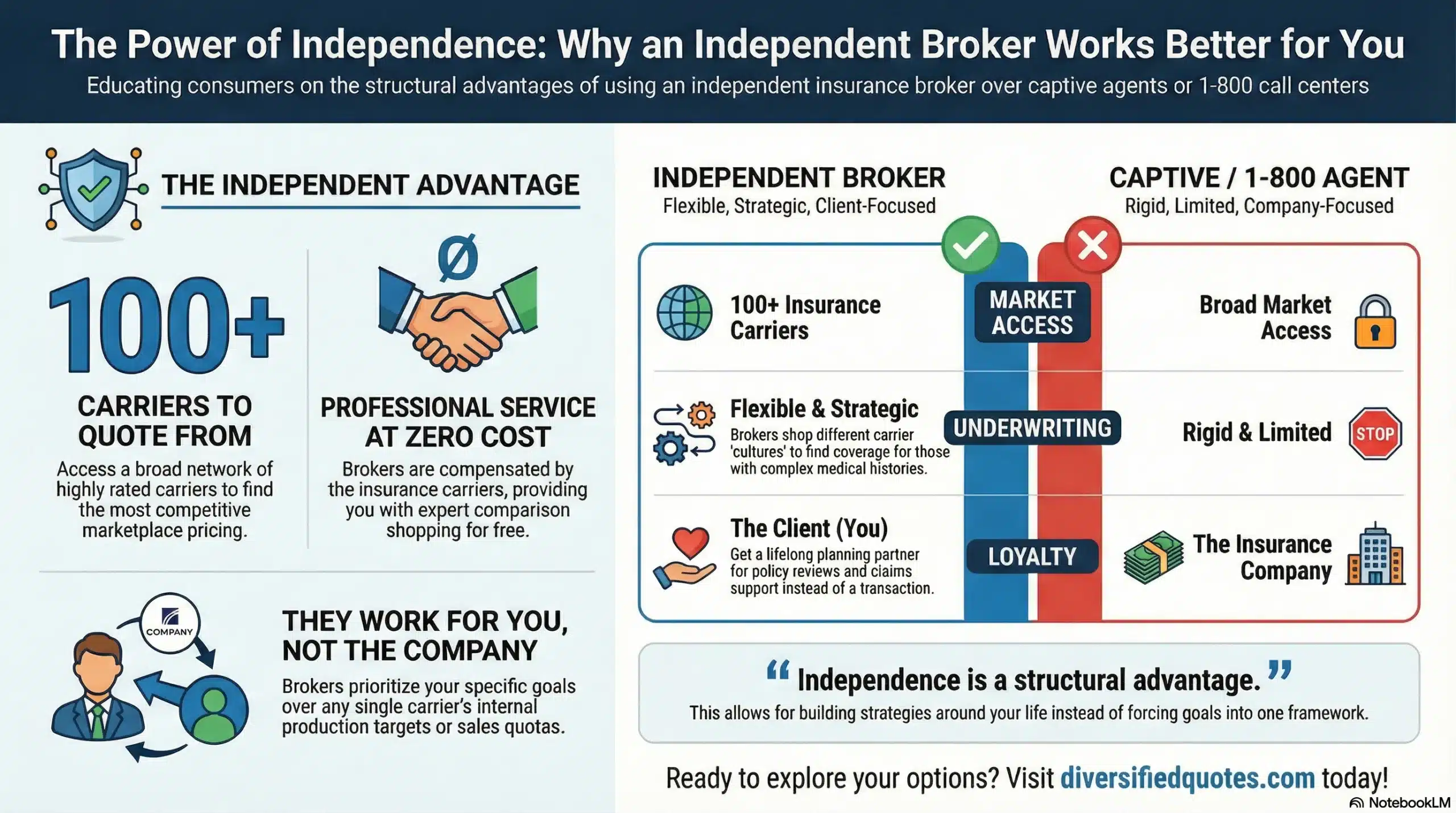Group vs Individual Life Insurance

Most Americans first get life insurance through work. It feels simple: check a box during open enrollment, select one or two times salary, name a beneficiary, and you’re covered. For many families, that employer-sponsored benefit is the first layer of protection they ever own. But the real question isn’t whether group coverage is useful — it’s whether it’s enough. Understanding group vs individual life insurance is one of the most important financial decisions you’ll make, because the structure you choose determines portability, pricing stability, underwriting flexibility, long-term guarantees, and ultimately whether your family’s protection survives career changes, layoffs, and retirement.
At Diversified Insurance Brokers, we help families compare workplace benefits against individually owned policies from more than 75 A-rated carriers. In many cases, the smartest strategy isn’t choosing one over the other — it’s designing the right combination. If you’re unsure how much coverage to carry across different life stages, start with our life insurance laddering guide to see how stacking policies can reduce cost while covering your biggest financial timelines.
Compare Individual Coverage in Minutes
See real-time rates for 10, 20, and 30-year term policies and compare them directly to your workplace plan.
Group life insurance is coverage provided through your employer or association. It is typically inexpensive for a base amount, often one times salary, and may not require medical underwriting up to a guaranteed issue limit. Because the risk is spread across a large employee pool, the carrier can simplify enrollment. This makes group coverage extremely convenient. However, convenience and cost today do not necessarily translate into the best long-term value. Group plans frequently increase in cost as you age, cap maximum benefits, and terminate when employment ends. Even portability or conversion options can become prohibitively expensive later in life.
Individual life insurance, by contrast, is a contract you own. You select the coverage amount, term length, riders, carrier, and beneficiary structure. Premiums for level-term policies are locked for the entire term period — often 10, 20, or 30 years — and the policy stays with you regardless of employment changes. This portability alone is one of the strongest arguments for owning personal coverage. If you anticipate job changes, career pivots, or entrepreneurial plans, relying solely on group insurance can create gaps at exactly the wrong time.
Cost comparisons between group and individual policies are often misunderstood. At younger ages and good health, individual term insurance is frequently less expensive than voluntary group buy-up options — especially over long horizons. While group base coverage may be free or heavily subsidized, supplemental amounts are commonly age-banded, meaning premiums increase every five years. By contrast, a 30-year individual term policy purchased at age 35 locks pricing until age 65. That stability can result in substantial long-term savings.
Parents with young children face particularly high protection needs. Mortgage balances, childcare expenses, lost income, and future college costs all converge during these years. If that’s your situation, review our planning breakdown for life insurance for parents with young children to confirm your numbers align with real-world obligations.
Underwriting is another major difference. Group coverage usually requires minimal health information up to guaranteed issue limits. That can be helpful for individuals with medical histories or those between doctors. However, higher “buy-up” amounts may still require health questionnaires. Individual policies can involve underwriting, but modern carriers offer accelerated or exam-free pathways at many coverage levels. And if you have health conditions, strategic carrier selection matters. For example, we routinely place policies for clients navigating complex situations like life insurance for diabetics with complications, where proper underwriting presentation significantly impacts approval class and pricing.
Portability becomes critical when employment changes. Most group coverage ends when your job ends. While some plans offer conversion privileges, the new policy is typically permanent insurance priced at your attained age — often far more expensive than a level-term alternative you could have locked earlier. Individual coverage eliminates that risk entirely. It follows you from employer to employer, through layoffs, career shifts, and retirement.
Beneficiary designations also deserve careful attention. Group enrollment forms are often completed quickly during HR onboarding, which increases the risk of outdated or unclear beneficiary language. With individual policies, you have greater flexibility and can structure proceeds properly. If you are unsure how to divide benefits across children or descendants, read our explanation of per stirpes vs per capita to avoid unintended consequences.
Some clients assume that because group coverage exists, they don’t need personal insurance. That assumption can be costly. Employer plans may cap benefits at two or three times salary, which often falls short of actual family protection needs. A common benchmark is 10–15 times income, depending on debts and future goals. For higher earners or individuals in specialized professions, custom underwriting strategies may be necessary. Our team works with entrepreneurs, executives, and even clients in emerging sectors like life insurance for the marijuana industry, where carrier selection is critical.
Another overlooked factor is insurability risk. Your health today determines your eligibility and pricing. Waiting until you leave an employer — or until health changes occur — can make coverage more expensive or even unavailable. Locking in an individual policy while healthy protects your future insurability. Even if you maintain group coverage, owning at least one personal policy provides long-term stability.
There are also scenarios where simplified or alternative approaches make sense. If you need fast approval or temporary bridging coverage, explore life insurance alternative options that can pair strategically with longer-term solutions.
For individuals in higher-risk categories — whether medical, occupational, or lifestyle-related — relying solely on employer coverage may not be wise. We regularly structure solutions for clients needing high-risk life insurance strategies, ensuring that underwriting complexity doesn’t leave families underinsured.
So when does it make sense to own both group and individual life insurance? In most cases, the optimal strategy looks like this: keep the free or inexpensive employer base coverage, secure a long-term individual level-term policy sized to your largest obligations, and only consider voluntary group buy-up if pricing is competitive after comparison. This layered approach balances cost, portability, and underwriting flexibility.
Review Your Group Plan Before Open Enrollment Ends
We’ll compare your workplace coverage to top individual carriers and help you choose the smartest long-term mix.
Schedule Your Free ConsultationThe decision between group and individual life insurance is not simply about price. It is about control, stability, and risk management. Employer coverage is a valuable benefit, but it should rarely be the only protection a family owns. Individually owned policies provide portability, premium guarantees, stronger beneficiary structuring, and broader carrier choice. When structured correctly, the combination of both creates layered security that protects your family regardless of career path.
Life insurance is ultimately about ensuring your loved ones are financially secure — whether that means covering a mortgage, funding education, replacing income, or protecting long-term wealth. Comparing group vs individual coverage side by side allows you to make that decision with clarity instead of assumption.

Talk With an Advisor Today
Choose how you’d like to connect—call or message us, then book a time that works for you.
Schedule here:
calendly.com/jason-dibcompanies/diversified-quotes
Licensed in all 50 states • Fiduciary, family-owned since 1980
Usually not. Most employer plans offer 1–2 times salary, which rarely covers long-term needs like mortgage payoff, income replacement, and college funding. Many families use group coverage as a base layer and add an individual term policy for full protection. See our life insurance laddering guide for structuring multiple policies efficiently.
In most cases, coverage ends when employment ends. Some employers offer portability or conversion options, but premiums can increase significantly. That’s why owning an individual policy provides long-term stability. Compare options using our high-risk life insurance guide if underwriting is a concern.
It depends on your age and health. Employer base coverage may be inexpensive, but voluntary group buy-up often increases by age band. Individual level-term policies lock premiums for 10–30 years and may cost less over time. You can compare structures using our life insurance alternative options page.
Yes — and in many cases, that’s the smartest strategy. Keep low-cost employer coverage and supplement it with a personally owned policy for portability and long-term guarantees. Parents may want to review coverage calculations in our guide to life insurance for parents with young children.
Beneficiary language matters, especially if you have multiple children or blended families. Terms like “per stirpes” and “per capita” affect how proceeds are divided. Review our explanation of per stirpes vs per capita to avoid unintended distribution outcomes.
About the Author:
Jason Stolz, CLTC, CRPC, is a senior insurance and retirement professional with more than two decades of real-world experience helping individuals, families, and business owners protect their income, assets, and long-term financial stability. As a long-time partner of the nationally licensed independent agency Diversified Insurance Brokers, Jason provides trusted guidance across multiple specialties—including fixed and indexed annuities, long-term care planning, personal and business disability insurance, life insurance solutions, and short-term health coverage. Diversified Insurance Brokers maintains active contracts with over 100 highly rated insurance carriers, ensuring clients have access to a broad and competitive marketplace.
His practical, education-first approach has earned recognition in publications such as VoyageATL, highlighting his commitment to financial clarity and client-focused planning. Drawing on deep product knowledge and years of hands-on field experience, Jason helps clients evaluate carriers, compare strategies, and build retirement and protection plans that are both secure and cost-efficient.
